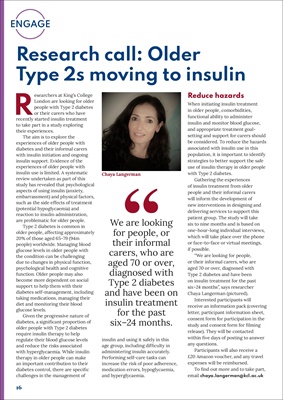
16
ENGAGE
We are looking
for people, or
their informal
carers, who are
aged 70 or over,
diagnosed with
Type 2 diabetes
and have been on
insulin treatment
for the past
six-24 months.
Research call: Older
Type 2s moving to insulin
Researchers at King's College
London are looking for older
people with Type 2 diabetes
or their carers who have
recently started insulin treatment
to take part in a study exploring
their experiences.
The aim is to explore the
experiences of older people with
diabetes and their informal carers
with insulin initiation and ongoing
insulin support. Evidence of the
experiences of older people with
insulin use is limited. A systematic
review undertaken as part of this
study has revealed that psychological
aspects of using insulin (anxiety,
embarrassment) and physical factors,
such as the side effects of treatment
(potential hypoglycaemia) and
reaction to insulin administration,
are problematic for older people.
Type 2 diabetes is common in
older people, affecting approximately
20% of those aged 65-79 (94m
people) worldwide. Managing blood
glucose levels in older people with
the condition can be challenging
due to changes in physical function,
psychological health and cognitive
function. Older people may also
become more dependent on social
support to help them with their
diabetes self-management, including
taking medications, managing their
diet and monitoring their blood
glucose levels.
Given the progressive nature of
diabetes, a significant proportion of
older people with Type 2 diabetes
require insulin therapy to help
regulate their blood glucose levels
and reduce the risks associated
with hyperglycaemia. While insulin
therapy in older people can make
an important contribution to their
diabetes control, there are specific
challenges in the management of
Reduce hazards
When initiating insulin treatment
in older people, comorbidities,
functional ability to administer
insulin and monitor blood glucose,
and appropriate treatment goalsetting
and support for carers should
be considered. To reduce the hazards
associated with insulin use in this
population, it is important to identify
strategies to better support the safe
use of insulin therapy in older people
with Type 2 diabetes.
Gathering the experiences
of insulin treatment from older
people and their informal carers
will inform the development of
new interventions in designing and
delivering services to support this
patient group. The study will take
six to nine months and is based on
one-hour-long individual interviews,
which will take place over the phone
or face-to-face or virtual meetings,
if possible.
"We are looking for people,
or their informal carers, who are
aged 70 or over, diagnosed with
Type 2 diabetes and have been
on insulin treatment for the past
six-24 months", says researcher
Chaya Langerman (pictured).
Interested participants will
receive an information pack (covering
letter, participant information sheet,
consent form for participation in the
study and consent form for filming
release). They will be contacted
within five days of posting to answer
any questions.
Participants will also receive a
£20 Amazon voucher, and any travel
expenses will be reimbursed.
To find out more and to take part,
email chaya.langerman@kcl.ac.uk
insulin and using it safely in this
age group, including difficulty in
administering insulin accurately.
Performing self-care tasks can
increase the risk of poor adherence,
medication errors, hypoglycaemia,
and hyperglycaemia.
Chaya Langerman